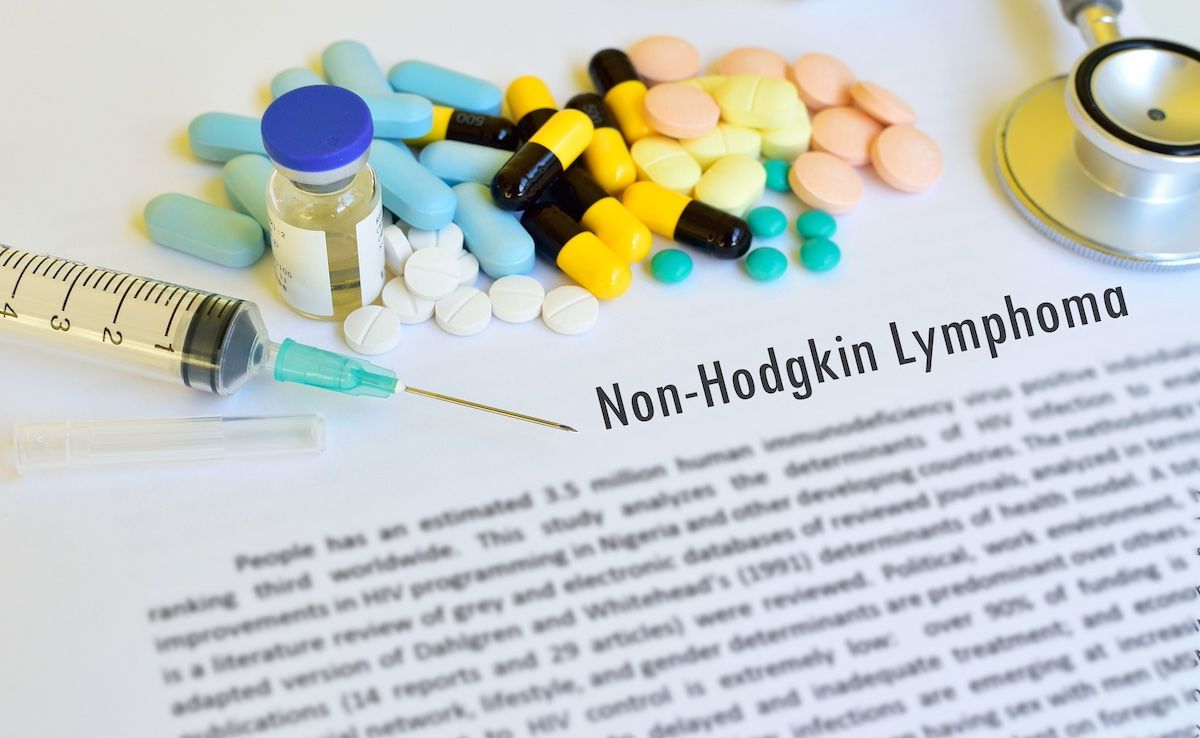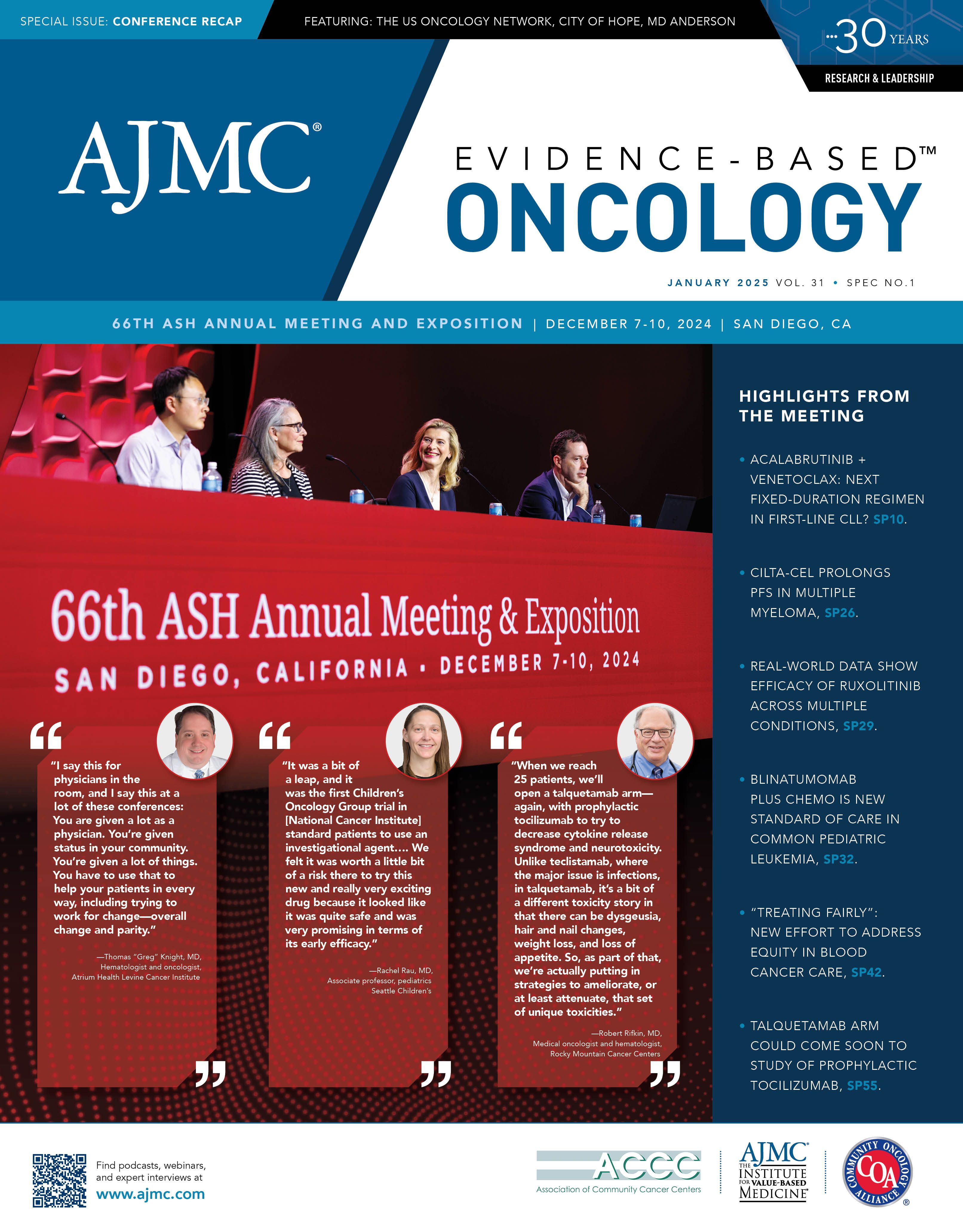- Center on Health Equity & Access
- Clinical
- Health Care Cost
- Health Care Delivery
- Insurance
- Policy
- Technology
- Value-Based Care
Epcoritamab Offers Durable Results in Relapsed B-Cell Lymphoma
This pair of posters presented at the 66th American Society of Hematology Annual Meeting & Exposition provides updates on epcoritamab, currently being investigated in the Epcore NHL-1 trial.
New long-term research presented at this year’s American Society of Hematology Annual Meeting & Exposition provide updates on the ongoing investigation taking place within the phase 2 Epcore NHL-1 trial (NCT03625037), which is currently evaluating the bispecific antibody epcoritamab in patients who have relapsed, progressive, or refractory B-cell lymphoma (BCL), a type of non-Hodgkin lymphoma.1 In the first poster, a study subanalysis looks at use of the subcutaneous CD3xCD20 T‑cell–engaging bispecific antibody in patients naïve to chimeric antigen receptor (CAR) T-cell therapy,2 and in the second poster, safety and efficacy data are presented from the phase 2a expansion study.3
In the Epcore NHL-1 trial, patients were treated every week in cycles 1 through 3, every 2 weeks in cycles 4 through 9, and every 4 weeks in cycles 10 and beyond until progressive disease or unacceptable toxicity; each cycle was 28 days. The data cutoff was May 3, 2024.2,3
Epcoritamab received an accelerated approval from the FDA in June.4
Epcoritamab in CAR T–Naïve Patients2
Previous research shows that despite its utility, CAR T faces roadblocks to its use in these patients, the authors highlighted, that include patient eligibility and fitness. Implications of their new data could widen the treatment window for epcoritamab in patients who could benefit from CAR T-cell therapy, with these results showing the agent can safely and effectively be administered before or after the cell-based gene therapy.
The patient population for this subanalysis (n = 96) had a median age of 69 (range, 31-83) years, which was slightly older than the 64 years seen in the overall study population (N = 157). More than half of the patients (52%) had a treatment history encompassing at least 3 prior lines, with the median being 3 (range, 2-11). Thirteen patients continued with epcoritamab at the data cutoff, and the most common reason for discontinuation was disease progression (54%).
Over a median study follow-up of 37.3 (range, 0.3-45.5) months, the overall response (ORR) and complete response (CR) rates were 61% and 45%, respectively. Additional median measures are promising:
- Duration of response (DOR): 18.4 (95% CI, 9.7-30.4) months
- CR duration: 28.6 (95% CI, 15.8–not reached [NR]) months
- Progression-free survival: 4.3 (95% CI, 3.4-10.9) months overall and 33.3 (95% CI, 19.4-NR) months in those with a CR
- Overall survival (OS): 15.4 (95% CI, 11.0-27.8) months overall and NR (95% CI, 27.8-NR) in those with a CR
- 83% of patients who achieved a CR had not started another antilymphoma therapy by the 3-year mark
Epcoritamab is being investigated in the ongoing Epcore NHL-1 trial among adult patients who have relapsed, progressive, or refractory B-cell lymphoma. | Image Credit: © jarun011-stock.adobe.com

CAR T was administered to 29% of the 35 patients who did receive another antilymphoma therapy, and 60% of them were still alive at the May 2024 data cutoff. Close to half (45%) of patients who could be evaluated for minimal residual disease (MRD) status were negative, with PFS and OS rates, respectively, that were higher vs MRD-positive patients: 42% and 52% vs 16% and 31%. There were 18 fatal treatment-emergent adverse events (AEs), half related to COVID-19, and the overall most common AE was cytokine release syndrome (CRS) in 60%. After an initial drop of approximately 20% in immunoglobulin G levels following epcoritamab initiation, these levels stabilized.
Their results, the authors highlight, echo overall Epcore NHL-1 trial findings.
Expansion Study Safety and Efficacy3
These data from the phase 2a expansion study of the Epcore NHL-1 trial show epcoritamab continues to produce a durable response at more than 3 years after initial administration. Adults patients were enrolled who had relapsed/refractory CD20+ large BCL (diffuse LBCL [DLBCL], high-grade BCL, primary mediastinal LBCL, and follicular lymphoma [FL] grade 3b) and at least 2 prior lines of systemic therapy.
As with the first poster, the patients received the step-up doses of 0.16 and 0.8 mg and 48-mg full doses, and the median of prior therapy lines was 3 (range, 2-11).
Overall, 12% of patients remained on treatment as of the data cutoff, with progressive disease again being the most common reason for treatment discontinuation (54%). For patients who remained on the treatment from more than 12 months to less than 24 months, 10.6% progressed, and for those who remained on treatment beyond 2 years, 6.9%. The ORR and CR were 59% and 41%, respectively, and the median DOR was 20.8 (95% CI, 13.0-32.0) months. Median PFS and OS were 4.2 (95% CI, 2.8-5.5) months and 18.5 (95% CI, 11.7-27.7) months, respectively, and median CR duration, 36.1 (95% CI, 20.2-NR).
In those who achieved a CR, median PFS was 37.3 (95% CI, 26.0-NR) months and median OS was NR (95% CI, 36.4-NR). Sixty-three percent of these patients were still alive at 3 years. For patients who had grade 3b FL or DLBCL, the ORRs and CR rates were 60% in both and 50% and 44%, respectively.
MRD status was evaluable for 119 patients, and 45% were MRD negative. Analysis of these MRD-negative patients from day 1 of cycle 1 shows 36-month PFS and OS to be 52% and 55% vs 18% and 30% in MRD-positive patients. Another evaluation on day 1 of cycle 13 showed that 98% of the patients who could be evaluated for MRD status were negative. Among the 15 patients with a CR who had to temporarily halt epcoritamab for more than 6 weeks, their status was the same at the first imaging after treatment reinitiation.
CRS was again the most common TEAE (51% overall), and 20 patients died, half related to COVID-19. Grade 3 infection rates showed stability up to week 144 (12-week periods), and cytopenias of at least grade 3 stabilized after the first 8 weeks, up through week 144 (12-week periods).
In light of these findings, epcoritamab has potential to be a curative therapy for patients who have challenging cases of R/R LBCL, the authors note.
References
1. First-in-human (FIH) trial in patients with relapsed, progressive or refractory B-cell lymphoma (EPCORE™ NHL-1). ClinicalTrials.gov. Updated December 3, 2024. Accessed December 9, 2024. https://clinicaltrials.gov/study/NCT03625037
2. Karimi YH, Clausen MR, Lewis DJ, et al. Efficacy and safety of epcoritamab monotherapy in patients with relapsed or refractory LBCL not previously exposed to CAR T: subanalysis of the Epcore NHL-1 trial. Presented at: 66th American Society of Hematology Annual Meeting & Exposition; December 7-10, 2024; San Diego, CA. Poster 1737. https://ash.confex.com/ash/2024/webprogram/Paper199225.html
3. Vose JM, Cheah CY, Clausen MR, et al. 3-year update from the Epcore NHL-1 trial: epcoritamab leads to deep and durable responses in relapsed or refractory large B-Cell lymphoma. Presented at: 66th American Society of Hematology Annual Meeting & Exposition; December 7-10, 2024; San Diego, CA. Poster 4480. https://ash.confex.com/ash/2024/webprogram/Paper198714.html
4. FDA grants accelerated approval to epcoritamab-bysp for relapsed or refractory follicular lymphoma. FDA. News release. June 26, 2024. Accessed December 9, 2024. https://www.fda.gov/drugs/resources-information-approved-drugs/fda-grants-accelerated-approval-epcoritamab-bysp-relapsed-or-refractory-follicular-lymphoma

Frameworks for Advancing Health Equity: Pharmacy Support for Non-Hodgkin Lymphoma
December 19th 2024Rachael Drake, pharmacy technician coordinator, University of Kansas Health System, explains how her team collaborates with insurance companies and providers to support treatment access for patients with non-Hodgkin lymphoma.
Listen
What Would Make Therapy Last? How About 2 Targets Each on B Cells and T Cells?
January 10th 2026The Chief Medical Officer of ModeX Therapeutics discusses MDX2003, a groundbreaking tetraspecific therapy that promises enhanced efficacy and safety in non-Hodgkin lymphoma treatment. This exchange appears in the January issue of Evidence-Based Oncology, the annual recap of the meeting of the American Society of Hematology.
Read More
